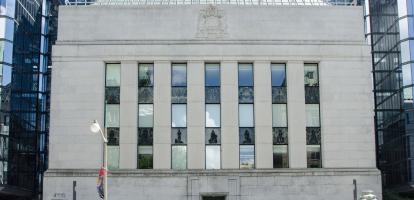COVID-19 is hurting more than our health. It has crushed our economy. And it is straining our governing institutions. A case in point is the federal government’s refusal to table a budget.
The C.D. Howe Institute publishes an annual report on the fiscal accountability of Canada’s federal, provincial and territorial governments. Transparency about taxing, spending and borrowing is fundamental to representative government. Budget votes determine whether governments stand or fall. Legislatures must authorize spending through the estimates process. They need timely, full information to do their work.
The fiscal years of Canada’s senior governments run from April 1 to March 31. Governments that present budgets and estimates well before April 1 empower people to ask questions and let legislators cast informed votes. At the other end of the scale, governments that present after April 1 disrespect the democratic process. By the time legislators see, let alone approve, the fiscal framework, new taxes may be in place, and money is already out the door.
Our governments’ records are mixed. Last year, the Northwest Territories, British Columbia and Nunavut were stars: all presented their budgets simultaneously with their estimates in February. Manitoba, Yukon, New Brunswick, Saskatchewan, Quebec and Nova Scotia presented their budgets and estimates in March. The federal government presented its budget in March, but its estimates only appeared in April. Among the laggards, Newfoundland and Labrador presented a budget and estimates in April, Ontario presented its budget in April and its estimates in May, Prince Edward Island presented both in June, and Alberta, which held an election last year, did not present either until October.
This year started better. The Northwest Territories, British Columbia and Nunavut again presented budgets and estimates in February, and Nova Scotia and Alberta joined them in the camp that showed respect for their legislators’ and their public’s right to see the numbers well in advance.
Yukon, Quebec and New Brunswick presented budgets and estimates in early March, and Manitoba followed later in the month. Ontario presented a fiscal update — not a full budget — in March, and its estimates did not appear until May. Saskatchewan presented its estimates in March and this week provided the budget that incorporates the full fiscal plan.
We are now in the second half of June. Prince Edward Island and Newfoundland and Labrador have yet to present anything. And although the federal government presented estimates in February, it has not presented a budget. The prime minister just ruled out a fiscal update, so with Parliament suspended until September 21, Canadians will see no formal plan for the 2020-21 fiscal year until it is half gone — if then. For fiscal transparency and accountability, that is a massive fail.
Ottawa’s budget-less 2020/21 is doubly notable because of the sums at stake. The feds are the biggest spenders among the senior governments in normal times and their commitments have ballooned since February. With revenues down, their borrowing is soaring. The Parliamentary Budget Officer’s $250-billion-plus tally for the deficit at the end of April was shocking at the time — yet the number has risen by tens of billions since. Unprecedented increases in spending and debt are occurring with no presentation of a fiscal plan to Parliament and Canadians.
Granted, COVID-19 has made the outlook uniquely uncertain. But the Parliamentary Budget Officer is managing to produce numbers. Budgets can present sensitivities to different scenarios. Governments can tighten their cycle for updates: Alberta presented fresh numbers in March. The United Kingdom uses the same fiscal year we do, COVID-19 has hit it every bit as hard as it has hit us, but it presented its 2020-21 budget on time.
The five governments that presented their 2020-21 budgets and estimates early deserve credit. The governments of the three that presented in early March also get a pass, and those that presented estimates, updates and budgets later that month at least did not use COVID-19 as an excuse to do nothing. But Prince Edward Island, and fiscally troubled Newfoundland and Labrador, deserve condemnation. And the failure of the federal government — which spends the most and should lead by example — to present, or even schedule, a budget is inexcusable.
Control over public money is fundamental to parliamentary government. COVID-19 is hurting our health and our economy. We must not let it undermine fiscal accountability as well.
Published in the Financial Post
William Robson is Chief Executive Officer of the C.D. Howe Institute.





